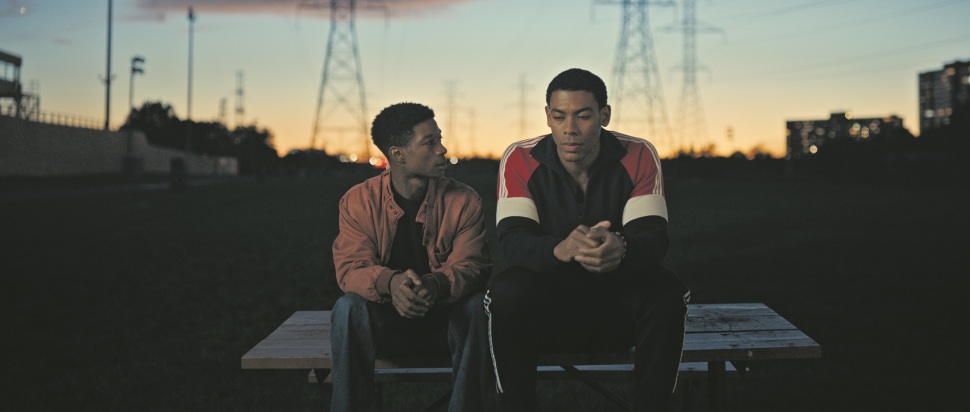Brother
Brother is a powerful and beautifully rendered drama about siblings from a Toronto suberb, told over three time periods
The idea of connection, identity, and the shattering of both are key to writer-director Clement Virgo’s adaptation of David Chariandy's award-winning novel following a Jamaican-Canadian family in the 1980s and 1990s. The opening scene of Brother is set in childhood: two teenagers climb a utility pole to get the best views over Scarborough, their leafy district of Toronto. The older boy, Francis (Aaron Pierre), is all ease and confidence as he encourages and instructs the younger and more timid Michael (Lamar Johnson) how best to navigate the live sections safely. As the wire buzzes, the film immediately cuts and upsets the expected coming-of-age chronology. Now, ten years later, Michael is a young adult, living with his mother (Marsha Stephanie Blake) who is dealing with demons neither he nor she addresses. Francis is gone.
When Michael’s old friend Aisha (Kiana Madeira) comes to stay, the puzzle pieces unfold through nonlinear flashbacks spanning from the opening climb to the present. While the question of Francis’ disappearance is the magnet towards which the pieces move, the connection between time jumps are themes of Michael’s burgeoning maturity – his love of music, the gang and police violence that hovers and threatens at the edge of their world – rather than a strict chronology. This out-of-order revealing of key developments ratchets up the tension, making Michael’s path to adulthood play almost like a thriller. The pacing, however, is not without pauses for quiet moments. Scenes of music-loving Michael exploring new records may not advance the plot, but the film would be less rich and meditative without these character moments. Brother makes a key argument for such human, ‘unessential’ moments in cinema as an enrichment of the form.
The synergy between Pierre and Johnson is central, and the pair work as perfect foils. Pierre’s assertiveness makes Francis’ moments of vulnerability all the more impactful, and Johnson navigates the development from an open and enthusiastic, if timid, youth to the quiet certainty of experience. The two have each other, and their mother’s isolation as an immigrant and single parent, heartbreakingly portrayed in its many complications by Blake, is all the more striking for it.
While the narrative framing is unique, the plot beats are well-trod and secondary figures outside the four central characters fill familiar stock types. Nevertheless, the wistfulness and melancholy with which Virgo infuses the proceedings, as well as full faith in his viewers to follow the jumps back and forth in time, makes Brother linger long in the mind. Through the lens of cinematographer Guy Godfree, the Toronto environs are strangely beautiful, shot in unnerving shadows through confident angles and rich colours. Told with less confidence on any level – performance, script, or structure – Brother could have become a case of style over substance; instead, it uses familiar ground, masterfully executed, to realise its storytelling power.
Elegant and elegiac, Brother is a poignant portrait of the messiness of love and loss – be that within a family or an entire community. Even if its ending feels inevitable, the path taken is remarkable.
Released 29 Sep by Curzon; certificate 15
Brother opens the Glasgow Youth Film Festival on 22 Sep
